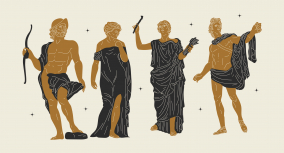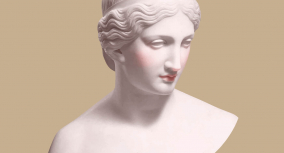Forgot about the test on Sophocle’s Antigone tomorrow? Need to write an essay about it and want to revise the main facts about the play? In this article by Custom-Writing.org experts, you can find all the information you might require. The most popular questions and answers about Antigone are gathered here.
If you have some time, we recommend looking through the rest of the material we have about this piece. However, when you are in a hurry, it gets as easy as finding the question you want to be answered in the list below! A brief but quite comprehensive explanation is provided for each of them.
- What report does the guard deliver to Creon?
Just after Creon has passed the order about a restriction regarding Polynices’ body, a guard arrives to deliver unexpected news. Someone dared to break the law and buried the body. Later, the audience finds out that it was Antigone who decided to follow the customs and give her brother the proper burial ritual. - Why does Haemon visit his father, Creon?
Long story short, Haemon visits his father to talk him out of killing Antigone. Creon’s law forbids anyone from burying Polynices, but Antigone decided to break it. After her crime, the king ordered her death, and nothing could change his mind. Haemon tries to reason with Creon and save his fiancé. - What action does Creon take as a result of Haemon’s visit?
After Haemon does his best to talk Creon out of the idea of punishing Antigone, nothing changes. The king is still not ready to take his words back and even comes up with a new way to make Antigone pay for her crime. Creon orders the guards to build a tomb and put Antigone there alive. - What is the goal of the protagonist in Sophocles’ play?
Antigone is the protagonist in Sophocles’ play, and her main aim is to bury her brother properly. Creon is a strict ruler and passes the law that forbids anyone from burying Polynices. However, she is not afraid of possible consequences, and even Ismene cannot change her mind. Antigone is ready to do whatever it takes to achieve her goal. - Who does Antigone bury?
Antigone, the main heroine of Sophocles’ play, buries her brother, Polynices. It was forbidden by the current king of Thebes, but the girl decided to pay more respect to the gods than to him. Eventually, she gets caught and punished for this crime. Creon entombs her alive but suffers the consequences of his decision. - Who dies in Antigone?
It is easier to say that out of all the main characters in the play, only Creon stays alive. Antigone’s suicide triggers a chain of other deaths that leave the king heartbroken. His son, Haemon, could not stand the news about her death and killed himself. The same happened to the queen, Eurydice. - Which character is arrested for burying Polynices?
When Creon becomes the new king, he immediately forbids anyone to bury Polynices’ body under the threat of death. However, his sister, Antigone, goes to give him a proper burial under cover of darkness. Soon enough, she gets arrested for this crime. Creon cannot take his words back, so he orders her punishment. - What role does the Chorus play in the first half of Antigone?
The Chorus plays an important role throughout the whole play. They provide the audience with some valuable insights that help with the understanding of the main ideas and morals. However, in the first half of Antigone, the Chorus also fills the audience in with the background. It helps the play to run smoothly. - Does Ismene die in Antigone?
Ismene is one of a few main characters in Sophocles’ play who does not die. When her sister, Antigone, gets arrested for burying Polynices, Ismene realizes that she was wrong. Even though Creon does not allow her to do it, Ismene wants to be punished and die as well. Therefore, she stays alive in the end. - How did Polyneices die?
Since Antigone is not the first story in the Oedipus trilogy and it describes the events happening after the war. However, there are some details about the death of the previous rulers. Polynices and Eteocles were brothers who did not manage to share the throne and killed each other in the battle. - How does Haemon die?
Antigone is supposed to be Haemon’s future wife, so naturally, it is a shock for him to find her dead body. There is only so much a man can take. After a failed attempt to kill his father, Creon, Haemon kills himself with the sword. It is yet another tragic death in the play. - In Antigone, which event reveals Creon’s tragic downfall?
In Sophocles’ Antigone, Creon is considered to be the tragic hero. There are several reasons for it, but the main one is that he faces a downfall caused by his pride. The decision the king makes at the beginning of the play leads to several deaths, including the ones of his close family members. - Who is Haemon in Antigone?
In Sophocles’ play, Haemon is one of the main characters, and he is the son of Creon. However, he only appears twice on the scene. At first, he tries to persuade his father to change his mind. Then, when Creon finally realizes his mistake, they both go to save Antigone. In the last scene, Haemon kills himself. - In Antigone, who reveals the details of the battle to the audience?
In Sophocles’ play, the Chorus plays an important role in filling in all the background details for the audience. One of such moments is when they reveal some information about the battle. Since the events of Antigone describe what happens after it, the war for Thebes needs to be presented as well. - What is the purpose of the Chorus in Antigone?
The Chorus appears in the play between the scenes for a reason. All the background details they reveal about Antigone‘s characters help the audience understand the events better. They also present some myths that are related to the scenes, which serve as some kind of comments on the main themes. - Why does Antigone use bridal imagery to speak of her imminent death?
Creon condemns Antigone to death, and just when she is about to enter the tomb, she gives the last speech. She compares her final destination to a bridal bed. Antigone implies that even though she will not have a chance to marry Haemon, she will still become a bride, but the one of death. - Why is Creon the antagonist in the play Antigone?
In Antione, Creon becomes the new king whose strict and unfair laws lead to a series of tragic events. He is considered the antagonist in the play because everything he does appears to be against the protagonist. Moreover, the king is not the most favorable character and makes a lot of doubtful decisions. - Which character from Antigone by Sophocles is an archetypal character?
Sophocles created Creon as an archetypal character. It is signified by the fact that the king seems to be a typical villain. Everything he does is pointed against Antigone. She is just a loving sister who wants to honor her family member. Therefore, Creon, with his stubbornness and unfair decisions, would always be recognized as a villain. - In what ways does Ismene differ from her sister, Antigone?
The main difference between the two sisters is that Ismene is much more obedient than Antigone. The main heroine tries her best to go against the king’s will, while Ismene refuses to do it. Moreover, Antigone is never seen as feminine and beautiful as her sister. It makes her jealous, bitter, and even rebellious. - Which argument does Creon make to defend his decision to arrest and execute Antigone?
In Sophocles’ play, when it appears that it was Antigone who broke the king’s law, Creon still goes on to arrest her. It does not matter to him that she is his son’s fiancé and simply a woman. Creon sees himself as the highest power, and the order should be kept. Therefore, every criminal has to be punished. - Which character is a dynamic character in Antigone by Sophocles?
In Antigone, there are not many characters that change somehow throughout the play. For example, Antigone remains stubborn till the very end. Creon, on the other hand, alters his decision by the end. Therefore, he is the main dynamic character in the play. Apart from him, Ismene also shows some signs of being more than a static heroine. - What motivates Antigone to defy Creon’s decree by burying her brother?
In Sophocles’ play, Antigone has her own reasons to stand by her decision to bury Polynices. Even though it is the king’s order, she does it anyways. The main reason Antigone goes against the law is that the gods’ will is always stronger than some man’s words. Therefore, Creon’s orders do not mean too much for her. - What does Antigone tell her sister outside the city gates?
Sophocles describes the period right after the war for Thebes in which two brothers killed each other. The next day, Creon, who becomes a new king, gives strict orders. Antigone takes her sister out of the city to tell her the news. That is how Ismene gets to know that Creon ordered not to bury Polynices’ body at all. - Who creates the main conflict for Antigone?
Since the whole plot development starts with Creon not burying Polynices properly, it is only logical to assume that he creates the main conflict. Antigone believes that every man has to be buried according to their traditions; otherwise, it is disrespectful to the gods. Therefore, she stands up against Creon’s law, which is the main clash in the play.





